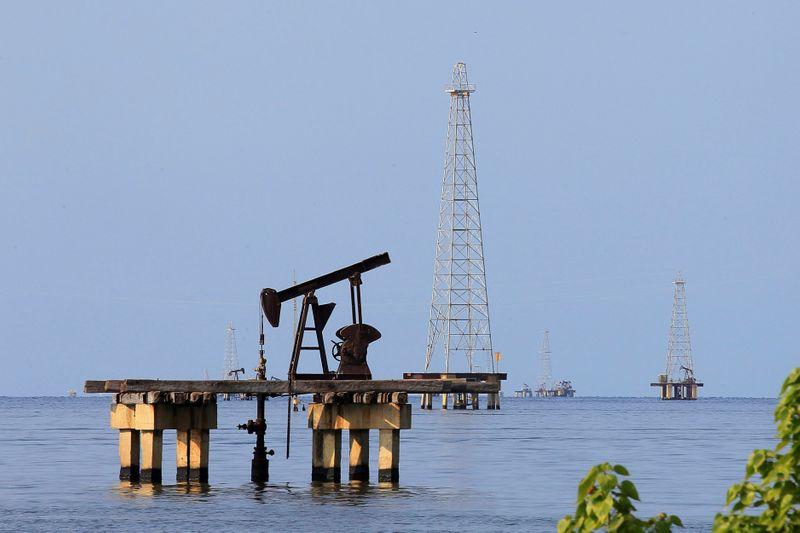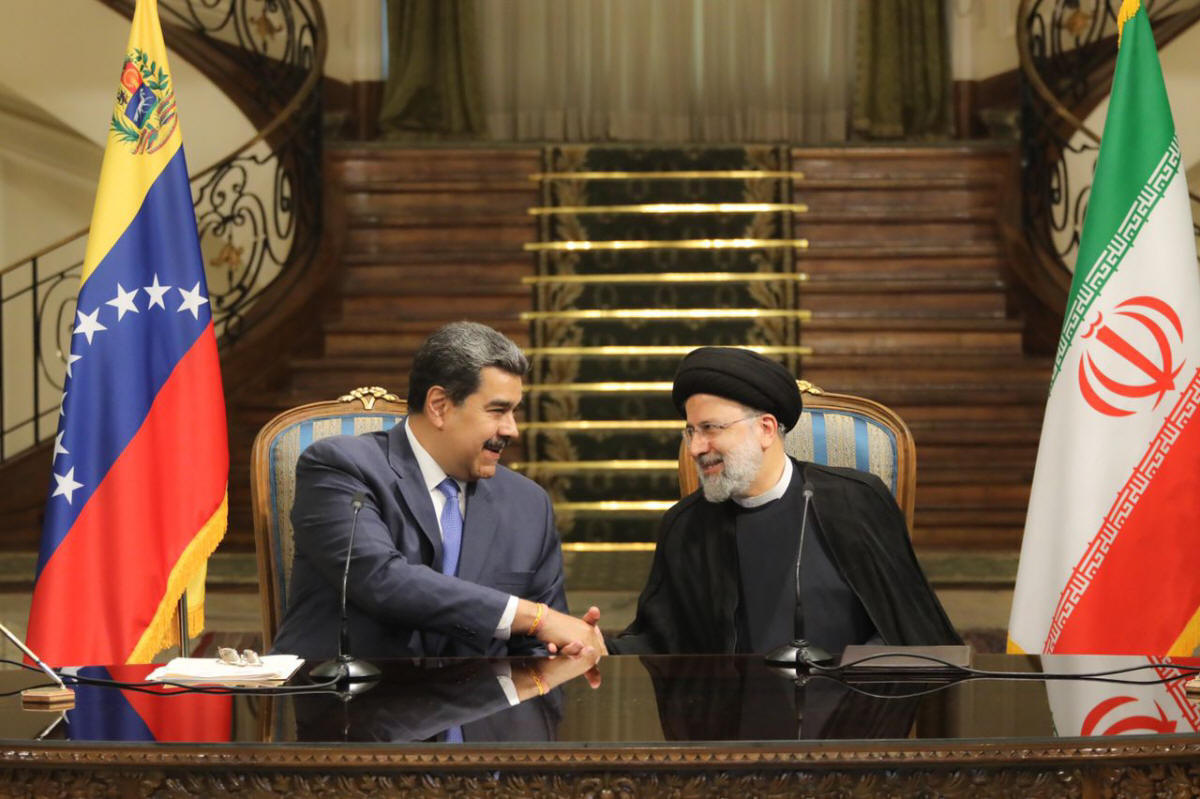www.aljazeerah.info
News, June 2022
Archives
Mission & Name
Conflict Terminology
Editorials
Gaza Holocaust
Gulf War
Isdood
Islam
News
News Photos
Opinion Editorials
US Foreign Policy (Dr. El-Najjar's Articles)
www.aljazeerah.info
|
Editorial Note: The following news reports are summaries from original sources. They may also include corrections of Arabic names and political terminology. Comments are in parentheses. |
Venezuela Maintains Stable Oil Output, to Restart Shipments to Europe, Maduro Inks 20-Year Cooperation Plan with Iran
Venezuelan Analysis, June 18, 2022
 |
 |
|
Venezuelan oil rigs |
President Nicolás Maduro shakes hands with his Iranian counterpart Ebrahim Raisi at the Saadabad Palace during the signing ceremony for a new cooperation agreement, June 13, 2022 |
Venezuela Maintains Stable Oil Output, To Restart Shipments to Europe
By Andreína Chávez Alava Jun 16th, 2022
Edited by Ricardo Vaz in Caracas
Eni’s first shipment to Europe could help alleviate storage bottlenecks by taking accumulated lower-quality diluted crude oil.
Oil exports in the Caribbean country have begun falling in recent months after China imposed new Covid-19 lockdown measures. PDVSA has likewise dealt with recurring returned cargoes from buyers. (Reuters)
Caracas, June 16, 2022 (venezuelanalysis.com) – Venezuela’s oil production remains steady while exports to Europe begin to resume following the easing of some US restrictions.
The Organization of Petroleum Exporting Countries (OPEC) placed Caracas’ May output at 717,000 barrels per day (bpd), as measured by secondary sources, 2,000 bpd less than April. The numbers reported directly by Venezuelan state oil company PDVSA stood higher at 735,000 bpd but slightly below the 775,000 bpd from the previous month.
However, oil exports fell for a third consecutive month, by 49 percent compared to April, reaching the lowest level since October 2020. Reuters reported that the drop was due to returned cargoes over alleged poor crude quality as well as delays caused by repair works on the José oil terminal, located in the northeastern Anzoátegui state. Two of PDVSA’s four upgraders were also temporarily shut because of power outages.
With a number of returned cargoes in recent times, PDVSA has been struggling with storage space. Accumulated lower-quality diluted crude oil (DCO) has forced the company to cut down production and exports. The bottleneck could be eased in the coming months following the arrival on June 10 of an oil tanker chartered by Italian oil company Eni to reportedly carry 650,000 barrels of DCO.
According to Bloomberg, the renewed shipments to Europe could give a moderate push to Caracas’ crude exports as sources claim that two European firms, Eni and Spain’s Repsol, are expected to lift a combined 2 million barrels in June.
Eni’s first cargo to Europe follows an authorization issued last month by the US Treasury Department greenlighting the Italian firm and Repsol to resume oil-for-debt swap deals with PDVSA that were halted by the former Trump administration in 2020. Chevron, the most notable lobbyist for US sanctions relief, was not granted a similar license but was allowed to negotiate its future operations in Venezuela. The US firm has stakes in four joint ventures with a combined 200,000 bpd capacity.
The two European corporations hold stakes in several oil and natural gas projects in Venezuela, including the co-owned Cardón IV venture, which last year produced a reported 284 million cubic feet per day of natural gas. Eni and Repsol are allegedly looking to use Venezuelan oil imports to make up for lost gas sales as well as for collecting unpaid debts.
The permissions granted to Eni and Repsol came as Washington tries to alleviate a supply crisis generated by the US and European embargos on Russian energy imports by redirecting Venezuelan oil shipments from China to Europe. The Asian giant has been Venezuela’s main crude buyer despite sanctions and the Covid-19 lockdown measures in China that have contributed to the recent decreases in PDVSA's exports.
Historically, oil sales have been Venezuela’s main source of foreign income but these were blocked by Washington’s sanctions program designed to cripple the economy in an effort to oust the Nicolás Maduro government. Foreign companies were forced to gradually abandon operations as well as oil agreements with Venezuela following the 2017 financial sanctions against PDVSA, the 2019 oil embargo, subsequent secondary sanctions and a raft of other measures throughout 2020.
As a result, the country’s crude output fell to historic lows, going from 1.9 million bpd in 2017 to less than 500,000 bpd by the end of 2020.
Despite a struggling oil industry under crushing US coercive measures, Venezuela has slowly improved crude production with assistance from Iran. In September 2021, Caracas and Tehran struck an oil-for-condensate swap agreement to dilute PDVSA extra-heavy crude into exportable grades, thus boosting the industry’s output and exports.
In May, the allied nations expanded the swap deal to add the supply of Iran’s flagship 29.5°API heavy oil, a lighter alternative to Venezuela's 16°API Merey blend, in order to feed refineries and increase gasoline and diesel production. On June 13, Reuters reported that an Iran-flagged tanker delivered around 1 million barrels of crude to PDVSA, the third shipment in less than two months. According to tracking data, the Iranian vessels returned home loaded with Venezuelan heavy oil and fuel in exchange.
The cooperation between the two US-sanctioned countries includes repair works in PDVSA's 146,000 bpd El Palito refinery in Carabobo state and the Amuay and Cardón refineries in Falcón state. The latter two form the 955,000 bpd Paraguaná Refining Complex, the largest in the hemisphere. The Middle Eastern nation had previously helped tackle fuel shortages in Venezuela by sending fuel shipments and supplying materials and expertise to restart refineries throughout 2020.
Recently, the Iran-Venezuela alliance was widened with President Nicolás Maduro visiting Tehran on June 10-11 to meet his Iranian counterpart Ibrahim Raisi and Oil Minister Javad Owji, who visited Venezuela in May. The leaders agreed on a 20-year cooperation deal to strengthen political and economic ties, with an emphasis on the oil and petrochemical sectors.
In Tehran, Maduro was additionally presented with the second of four new oil tankers built between Iranian company Sadra and Venezuela's PDVSA, with an 800,000 barrel capacity.
The Venezuelan mandatary’s two-day visit to Iran was part of an ongoing foreign tour which included stops in Turkey, Algeria, Kuwait, Qatar and Azerbaijan to expand diplomatic and economic relations.
While in Kuwait, Maduro held a meeting with OPEC's upcoming secretary-general Haitham Al Ghais. "[We] agreed on the need to continue creating mechanisms to achieve stability in the world energy market," he tweeted on Tuesday.
Venezuela Maintains Stable Oil Output, To Restart Shipments to Europe | Venezuelanalysis.com
***
Venezuela’s Maduro Inks 20-Year Cooperation Plan with Iran Amidst Foreign Tour
“With our tour of Turkey, Algeria and Iran we have consolidated the deep friendships as brother peoples,” said Maduro.
Edited by Ricardo Vaz in Caracas.
Mexico City, Mexico, June 13, 2022 (venezuelanalysis.com) –
Venezuela and Iran signed a 20-year cooperation agreement Saturday during President Nicolás Maduro’s visit to the Asian country with his Iranian counterpart Ebrahim Raisi.
The two-day visit to Iran comes as part of a foreign tour by the South American president who had earlier stops in Turkey and Algeria.
“We have reached the year 2022 in better shape, more prepared and stronger to unite the forces of Iran and Venezuela in a truly impressive map of cooperation,” said Maduro, who was accompanied by a high-ranking political and economic delegation.
Saturday’s deal focuses on agriculture, energy, science, technology, communications, transport, tourism, health and education.
The deal also builds on long standing cooperation on energy matters, with Iran playing a key role in Venezuela’s effort to recover its oil industry amid punishing United States sanctions. Maduro went on to meet directly with Iranian Oil Minister Javad Owji, who earlier visited Venezuela in May.
The new 20-year deal reportedly also includes repair of Venezuelan refineries and the export of technical and engineering services. Venezuela will additionally receive the second of four new oil tankers built between Iranian company Sadra and Venezuela's PDVSA, with an 800,000 barrel capacity.
“The signing of the 20-year cooperation document between Caracas and Tehran is an example of the firm will of the authorities of both countries to extend cooperation in all directions” said Raisi.
The Irainian president also specifically praised Maduro, saying he was a leader “who has shown a policy of fighting against imperialism and has managed to overcome sanctions and threats.”
“Venezuela has shown exemplary resistance against sanctions and threats from enemies and Imperialists,” added the Iranian president.
The US has likewise maintained a strict sanctions regime on the Iranian government, which was intensified after the collapse of the 2015 Joint Comprehensive Plan of Action concerning Iran’s nuclear program following former US President Donald Trump abandonment of the deal.
Venezuela has been under a similar maximum pressure campaign since 2017 when the US Treasury Department levied financial sanctions against PDVSA followed by an oil embargo in 2019 as well as secondary sanctions against shipping companies and other intermediaries.
While in Iran, Maduro also met with Supreme Leader Ayatollah Ali Khamenei, heaping praise on the country’s maximum figure for assisting Venezuela as it faced down the US-led sanctions campaign.
"You came to our aid when the situation in Venezuela was very difficult and no country was helping us," said Maduro.
For his part, Khamenei lauded the “resistance” of Iran and Venezuela.
"The two countries have such close ties with no other country, and Iran has shown that it takes risks in times of danger and holds its friends' hands," said Khamenei.
Maduro’s visit to Iran came on the heels of trips to Turkey and Algeria, where he met with Presidents Recep Tayyip Erdoğan and Abdelmadjid Tebboune, respectively.
While in Algeria, the two countries reaffirmed their solidarity and support for Palestine, the Sahrawi Republic and Libya in their historic struggle for self-determination.
“With our tour of Turkey, Algeria and Iran we have consolidated the deep friendships as brother peoples, setting up agreements and great achievements that translate into shared well-being,” wrote Maduro on Twitter.
The Venezuelan president embarked on his foreign tour as the IX Summit of the Americas was held in Los Angeles, California. The US opted not to invite Venezuela, Cuba, and Nicaragua to the regional gathering but was met with boycotts and protests from regional leaders over its decision. The three countries’ exclusion ultimately overshadowed events at the summit.
Venezuela for its part instead focused on deepening “South-South” relations with allies across the globe, a long standing foreign policy priority for the country.
***
Share the link of this article with your facebook friendsFair Use Notice
This site contains copyrighted material the
use of which has not always been specifically authorized by the copyright
owner. We are making such material available in our efforts to advance
understanding of environmental, political, human rights, economic,
democracy, scientific, and social justice issues, etc. We believe this
constitutes a 'fair use' of any such copyrighted material as provided for
in section 107 of the US Copyright Law. In accordance with Title 17 U.S.C.
Section 107, the material on this site is
distributed without profit to those
who have expressed a prior interest in receiving the included information
for research and educational purposes. For more information go to: http://www.law.cornell.edu/uscode/17/107.shtml.
If you wish to use copyrighted material from this site for purposes of
your own that go beyond 'fair use', you must obtain permission from the
copyright owner.
|
|
|
|
||
|
||||||


